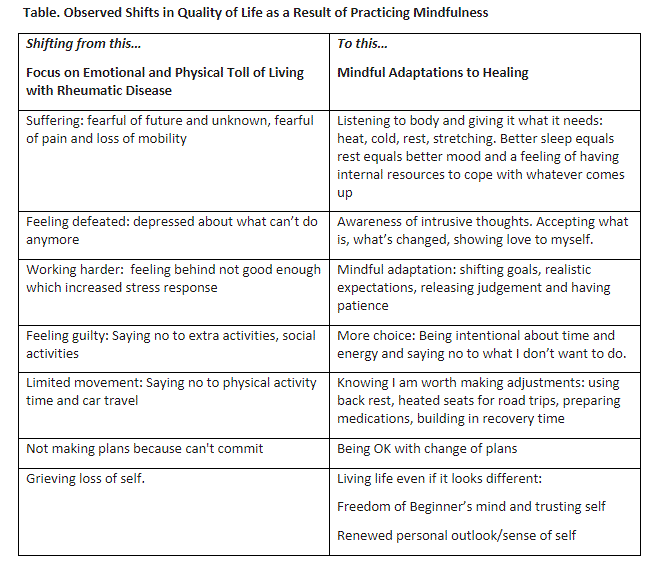Session Information
Date: Sunday, November 12, 2023
Title: Patient Perspectives Poster
Session Type: Poster Session A
Session Time: 9:00AM-11:00AM
Background/Purpose: I’ve been living with symptoms of PSA and fibromyalgia for over 15 years. Four years ago, after flareup that severely impacted my mobility where I was unable to walk up/down stairs, get in/out of car, I was diagnosed with non-radial axial spondylarthritis. My quality of life was compromised and my future outlook felt grim.
Intervention: I began learning about spondylarthritis: what to expect, treatments, prognosis and ways to ease the pain. In the past my approach to rheumatic disease has been to just deal with the pain, ignore it, and keep pushing through, but this time I knew I had to do something drastically different. I needed to build a better relationship with my body. I tried complementary strategies to medical treatment such as meditation, reading, journaling, resting, leaving job, reducing commitments, massage, walking/movement, aqua therapy, and gluten- and sugar-free diets. Certainly all of these complementary approaches helped, but the real change occurred when I made a mental shift from thinking of my condition as “something I have to fix or change” to “something that I have to make peace with.”
My rheumatologist recommended mindfulness training and a trusted friend recommended the Mindfulness Based Stress Reduction (MBSR) class, specifically. Over the course of six months, I began doing it in a self-directed way by watching videos, reading, reflecting, and practicing mindfulness activities, specifically:
- Body scanning and breathwork
- Building Awareness and slowing down
- Perspective changing
- Responding vs. reacting
- Not judging, self-love (loving kindness)
- Individualized choice
- Asking for what I need from family, from doctors
Maintenance: I still wake up tired with neck, hip, and back pain from my inflammatory arthritis. Mornings tend to be slow moving for me, and I don’t commit to doing too much in the first two hours after I wake up. But now I have built awareness of this into my life. I look forward to my internal body scan as part of my daily mindfulness meditation routine. Fatigue is something I still experience, but what I tell myself about such things is different. These don’t make me less than. They are my body’s way of communicating with me. Am I going to listen? Am I going to advocate for myself? It is an ongoing process of befriending my body.
Quality of Life: I am much more aware of how I engage with my life and with stressors. My nervous system feels more relaxed, my heart rate is lower and I’m living with increased ease of wellbeing. This means more movement, presence with nature, getting outside, engaging in social activities and feeling more connected, less isolated. I am even planning a family trip overseas and working with my rheumatologist to have medications with me in case I have a flare up. Mindfulness helps me experience less suffering over pain (Table). I am less focused on needing to find a solution and instead focused on knowing that healing is within me.
To cite this abstract in AMA style:
Patino-Lydia V. Practicing Mindfulness to Improve Quality of Life [abstract]. Arthritis Rheumatol. 2023; 75 (suppl 9). https://acrabstracts.org/abstract/practicing-mindfulness-to-improve-quality-of-life/. Accessed .« Back to ACR Convergence 2023
ACR Meeting Abstracts - https://acrabstracts.org/abstract/practicing-mindfulness-to-improve-quality-of-life/

